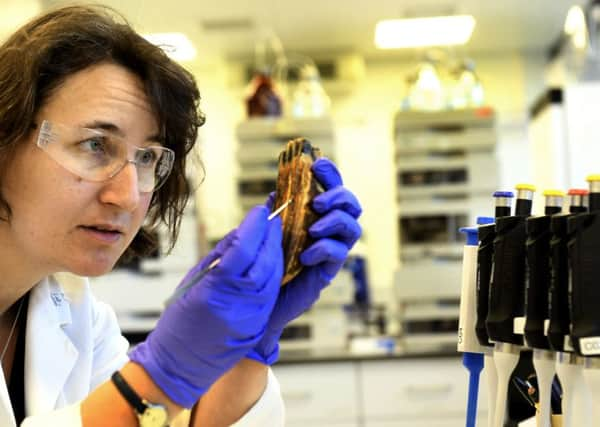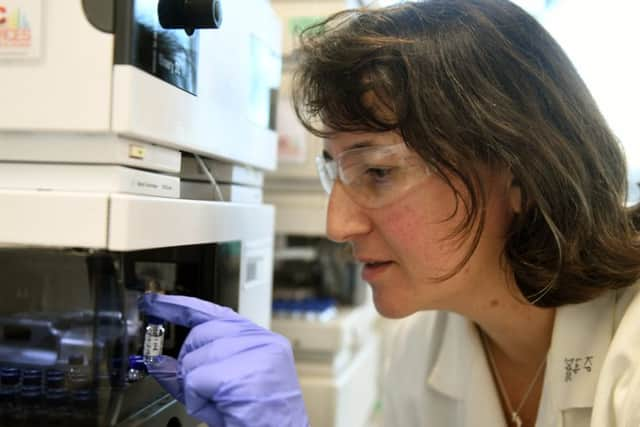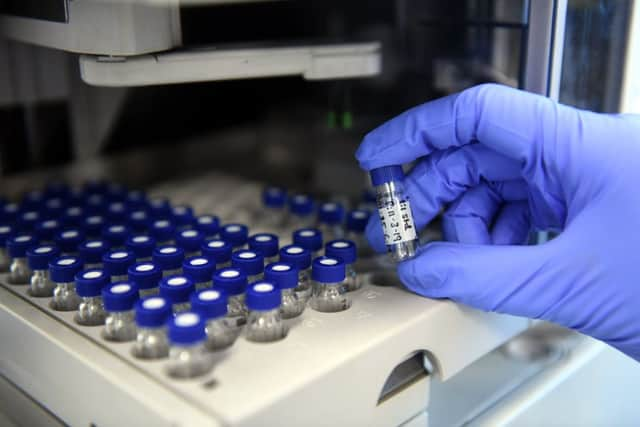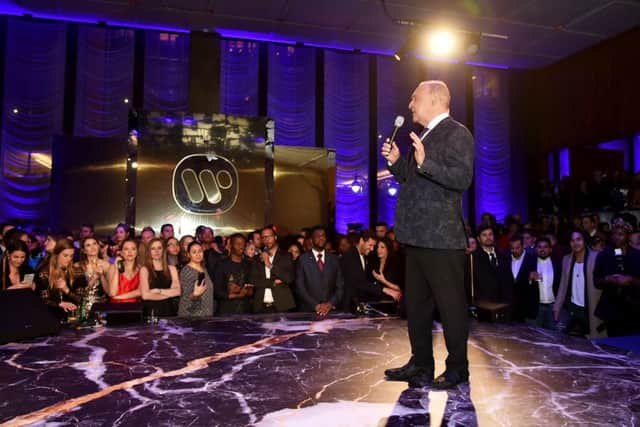Why this York climate change scientist has been awarded £75,000 by one of the world’s richest men


At barely the size of a sesame seed each, it seems hard to credit that the tiny opercula – effectively “trapdoors” snails use to shut themselves away inside their shells - inside the bag being held by Dr Kirsty Penkman have a vital role to play in humanity increasing its understanding of climate change.
The work based in her laboratory at the University of York but which takes her and her students and staff around the world is complex but their goal is simple; understanding how climate change operated in the past to allow for more accurate projections of what we might face in future years. Their approach to a process called amino acid racemization (also known as amino acid dating) isolates a fraction of protein from fossil shells that wasn’t in contact with the natural environment and therefore can be dated more accurately.
Advertisement
Hide AdAdvertisement
Hide AdPenkman’s work has been so successful she has been the recipient of multiple scientific awards - and has now been singled out for international acclaim. The 41-year-old analytical chemist has just been named as one of only three British winners of the 2020 Blavatnik Awards for Young Scientists, which comes with a £75,000 cash prize to be put towards supporting her work.


The awards are run by the New York Academy of Sciences and the Blavatnik Family Foundation, which is headed by billionaire businessman Sir Leonard Blavatnik. The Ukrainian-born Blavatnik, who was recently listed by Forbes as the 27th richest person in the world, is not an individual without controversy. In 2015, a group of academics wrote an open letter warning Oxford University, which had previously accepted a £75m donation from him and named a building after him, should “stop selling its reputation and prestige to Putin’s associates”.
Oxford said in response at the time that it had a “thorough and robust scrutiny process in place with regard to philanthropic giving”, while representatives of Blavatnik told The Financial Times in June 2019 he had not met Putin since 2000. Tens of millions in donations from him have also been accepted by prestigious American universities such as Harvard and Stanford.
Ironically, given he is now supporting Penkman’s work on climate change, part of Blavatnik’s fortune came through making $7bn from the 2013 sale of a Russian oil company he had a stake in.
Advertisement
Hide AdAdvertisement
Hide AdPenkman says of accepting the award from his foundation in these contexts: “If rich people choose to do good things with their money, then that’s good. It is slightly ironic some of this money is coming from what has been fossil fuels but if this raises some awareness of our need to input resources into renewable energy I hope it is a sign of people changing priorities. Even BP and Shell are getting into renewables.


“I’m trusting in the New York Academy of Sciences and the other scientists that have gained this award.”
Penkman is originally from Essex but spent much of her childhood in Oman, where her father worked as a radar engineer. She says she always loved history and archaeology as well as science and during the final year of a Chemistry degree at Oxford University she got the chance to do a placement in a research laboratory for archaeology.
“Two months in, I thought this is what I want to do for the rest of my life - being able to apply the chemistry that I love to research questions about the past was the perfect marriage for me.”
Advertisement
Hide AdAdvertisement
Hide AdAfter doing a PhD in Newcastle, she moved to York to work for the university in 2004 and continue her research. Penkman discovered opercula are particularly suited for amino acid dating, partly because they are made from calcite which remains stable even over millions of years.


“These have been collected for hundreds of years,” she explains. “You find these in Victorian gentleman’s archives kept in places such as the Yorkshire Museum. Suddenly we realised the mineral is so stable we can use these to date over these million-year timescales.
“From getting the sample in the lab to getting meaningful data is two weeks. For example to strip out all the other protein we are not interested in, we sit our samples in a very strong bleach similar to what you use at home but stronger. That oxidises it, blasts all the other protein that can be affected by the environment and just leaves behind this little fraction we are interested in. That is a sample sitting in a lab for 40 hours while we are getting on with other things.”
Work at one site in Germany brought forward surprise findings that a period of global warming which had occurred 125,000 years ago affected Central Europe between 2,000 to 5,000 years later than it had in Greenland.
Advertisement
Hide AdAdvertisement
Hide Ad“There was this lag between ice sheets melting and Germany getting warmer. The size of the lag was much bigger than we thought. Now we now that has happened we can start putting it into climate models, we can start to understand the feedback systems better. It is using the past record to understand what is going to happen in future.”
In addition to opercula, Penkman has also been involved in analysing ancient egg shells and, in a more recent development, mammoth teeth thanks to a breakthrough with a PhD student called Marc Dickinson who worked with her to develop a technique to analyse enamel which had previously not been possible.
“That has taken us from analysing the things next to the important animals to suddenly moving to dating the actual mammal there,” she explains. “He has started his work on elephants, we have started to expand to other material and ultimately, hopefully, humans. Enamel has always been one of the goals - can you get direct data from a mammal which is incredibly hard to do. Being able to drive it forward with a PhD student was really valuable.”
Her work covers a vast span of time - the last 2.5m years known as the Quaternary Period which she says is “defined by its big swings in climate”. “We have experienced conditions as warm as today and we’ve experienced incredibly cold conditions where we’ve had ice sheets covering Yorkshire as far south as London. Yet 125,000 years ago, it was warm enough for hippos to hang around in Yorkshire.”
Advertisement
Hide AdAdvertisement
Hide AdSo is our current climate change man-made? Penkman has a simple answer - yes.
She says the amount of carbon dioxide in the atmosphere - which have a close correlation with temperature rises - is now bigger than at any point in the last 800,000 years with a dramatic rise in levels coinciding with the arrival of industrialisation 150 years ago.
“The data shows the carbon dioxide change between those time periods, the glacials and inter-glacials, is of the same magnitude as the carbon dioxide change between pre-industrial and now. When it is cold we have CO2 of 180 parts per million and when it is warm we always have CO2 at around 280. 2017 was the first year we never dipped below 400. There is always going to be some natural variation. But you can’t put that much carbon dioxide into the system without it having an impact on climate.
“We don’t know what happens because we have never been at these high levels over the time period we have those direct records, so for at least the last 800,000 years. One of the reasons why it is so important to do this type of science is because we don’t know what to expect. We haven’t seen this scenario before. But at least by studying these past warm and cold periods, we can understand the kind of feedback effects we might see.
Advertisement
Hide AdAdvertisement
Hide Ad“At the moment we don’t think we have reached a tipping point. But we can’t continue in this way without expecting severe climate change, much more severe than we have seen in the last ten years or so. That is why we need to do the research to understand where we could be going.”
She says individuals can do things differently to reduce their carbon footprint by cycling rather than using the car or taking the train instead of flying, as well as making dietary changes to reduce meat intake.
“There are little things we can do that can make a difference. These things clearly have consequences on businesses but 100 years ago, there were lots of ostlers. Now there aren’t many any more because we went through a big shift from a horse-driven economy to a petrol-driven economy. So yes there will be change, we are going to be moving from a petrol to perhaps electric or hydrogen driven economy but people will weather that change. We can’t ignore the need to make that change.
“I have always been pretty climate-conscious but I have been doing more perhaps because Governments haven’t taken as much leadership as they should have done. The UK is pretty good but is not going as far as it could do. It has meant personal responsibility has become more important. Perhaps 20 years ago I would have thought I can do a little but governments will legislate for this. Now I’m thinking hang on, they have still not legislated maybe I need to do something.
Advertisement
Hide AdAdvertisement
Hide Ad“We have an electric car and I cycle pretty much all the time. I try and limit carbon resources where I can.”
She says while there have been some promising recent developments, such as BlackRock, the world’s biggest asset manager, recently announcing plans to start divesting from fossil fuel companies, there is much to be done. Penkman says she was baffled by the Government considering a potential cut to air passenger duty for domestic flights following FlyBe’s recent financial troubles.
“I think we need to do more. I completely understand the reason to think about saving jobs but I think cutting the aviation tax is a really retrograde step. That is putting business over environment. I personally can’t understand that when we are at a point where climate change is so important.
“I learnt about global warming when I was at school 30 years ago, we have known about this for a long time and people have done work on it for decades. But it has really got more into public consciousness than it was five years ago but we have got to make the decisions now as well, we can’t just kick it down the road.
Advertisement
Hide AdAdvertisement
Hide Ad“It is suddenly becoming some people’s reality. These Australian fires were predicted in the 1980s. Credit to those scientists who did that work but let’s not get in a position where all those predictions for 2050 actually come true. That is why we need to do the research to understand where we could be going. My hope is that will enable people to make the right decisions on an individual and a government and a trans-national basis.”
But despite the undoubted scale of the challenge, Penkman says she believes there are good reasons for optimism.
“I actually do feel really positive about it - moving to a renewable energy economy is a positive change. Part of what I am excited about is when humans have needed to change we have done it. We just have to have the will to do it.”
Award ‘brings global platform’
Sir Len Blavatnik has praised Dr Penkman and her fellow award-winners, saying their honours will “enable them to be recognised globally”.
Advertisement
Hide AdAdvertisement
Hide AdThe other two winners were Imperial College London Professor Claudia de Rham, who has constructed a viable theory for massive gravity that could hold the answers to many important questions in physics and Professor
Timothy Behrens, who works at both the University of Oxford and University College London and has developed innovative models for mapping the brain’s electrical signals that have implications for brain surgery.
Sir Len said: “We are incredibly proud to elevate these select scientists to an international stage.”